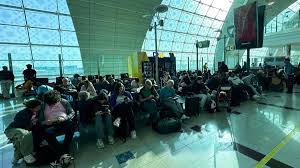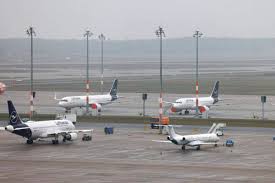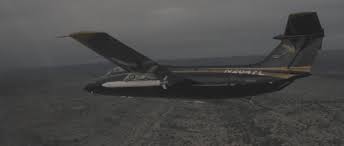
Daniel Stables
While “vanlife” is far better established in the US, on British shores the trend retains the enthusiastic camaraderie and frontier spirit of a new movement.
“The whole time I was building the truck, I had the North Coast 500 in my head; those beautiful landscapes,” said Tom Duckworth, who spent three years living in an ex-army truck he converted into a tiny home.
“It took two years before I managed to get up there, but when I did, it was amazing: 2,500 miles in 18 days, all the way up to and around the north coast of Scotland.” Whisky tasting in Thurso, hikes through the Fairy Pools of Skye and spectacular hairpin drives on the Applecross peninsula lay ahead – not that it was a smooth ride all the way. “The majority of it is single-track roads, so driving it in a 9.5-tonne truck with no power steering was… interesting.”
Such are the joys and challenges of life for a growing cohort of young Brits who are ditching the strictures of the 9-to-5 (not to mention council tax) and embracing “vanlife”, converting vans and lorries into boho mobile homes and moving wherever the feeling takes them. The artistry of their builds and the beauty of their destinations are tailor-made for Instagram, where some 10 million posts bear the #vanlife hashtag – though the trend is far better established in the US than it is on British shores.
In the UK, vanlife retains the enthusiastic camaraderie and frontier spirit of a new movement, and it has breathed new life into the staid image of traditional British campervanning, lending a voguish cachet to what was once the preserve of budget-conscious families and gently adventurous retirees.

Genghis is a decommissioned British army truck with a rooftop beer terrace (Credit: Tom Duckworth)
It’s hard to imagine a more British vanlife build than Duckworth’s, which he christened Genghis. Housed in a decommissioned Bedford MJ British army truck, it recalls the study of an intrepid Victorian explorer with its wine-red Chesterfield sofa, copper kettle and vintage maps plastered on the walls. A bed swings down from the ceiling; there’s a rooftop “beer terrace” complete with real ale tap; and solar panels generate more than enough electricity for a hot rain shower in the tiled bathroom, which is decked out in vintage brass fittings. It’s all very professional, but the build involved more than a touch of the British tradition of “make do and mend”.
“I had to be quite resourceful – at one point I was using beer cans to build the roof,” said Duckworth. Half of what he used came out of skip bins; in all, he spent around £15,000 on the restoration. “Not bad for a house,” he pointed out.
The coronavirus pandemic has only fuelled Britons’ already burgeoning appetite for slower, more immersive travel. A 2019 survey by Hidden Scotland found that 83% of people prefer “slow travel” to “tick-box tourism”; while GlobalData concluded in May 2021 that the increased hassle of international travel and a growing population of remote workers meant that longer trips, which foster “a connection with local people, culture, food and music”, are set to become the norm.
It’s a slower form of travel, which means you can enjoy the journey
Enter: vanlife. “It’s a slower form of travel, which means you can enjoy the journey,” Duckworth said. “Go 50 miles a day, and you can bop in and out of loads of awesome places en route.”
The environment is another matter of pressing concern for young Brits, 41% of whom said they wanted to be more environmentally and socially conscious on their travels in a recent poll. Vanlife’s future, like that of motoring generally, is electric, and forward-thinking vanlifers are also converting diesel engines into biodiesel, running on vegetable oil.

A growing number of Brits are ditching the 9-to-5 for life on the road (Credit: Quirky Campers)
“There’s been an awakening to climate change, and a desire to consume less in all aspects of our lives,” said Matthew Payne, an adventurer and filmmaker who, like Duckworth, has converted an ex-military truck into a home on wheels. “Living in an old vehicle that has already lived a life and been saved from the scrapheap is far better for the environment than building and heating housing.” It can also be very comfortable; while from the outside Payne’s truck, Matilda, has a brutish, militaristic aspect, its interior gingham cushions and rustic worktops recall a farmhouse kitchen.
Much of vanlife’s appeal lies in the opportunities it presents to learn new skills on the job, and the movement chimes with the British tradition of eccentric amateurism. It’s easy to imagine that it attracts the same kind of people who would once have spent their weekends building jet-propelled shopping trolleys or honing the perfect all-in-one Wallace and Gromit-style breakfast machine. In vanlife, as in all things, mistakes are part of the journey.
Or, as Duckworth put it, “You need to mess things up and pipes need to explode for you learn how to do it better next time.”
Vanlifers congregate to compare their builds and share stories of their adventures on the road at Camp Quirky, an annual festival in Northamptonshire where tents house workshops on solar panel installation, carpentry and insulation, among other essential van-building skills.
One of those for whom the vanlife was a leap into the unknown is Amy Nicholson, who tours the UK full time in her converted Vauxhall Vivaro. Originally from Kent, Nicholson’s first taste of van living was that classic Antipodean adventure: touring New Zealand in a campervan. She now works remotely as a freelance marketing consultant from wherever she’s pitched up.
“I fell in love with the simple life that vanlife brings,” she said. “Because you are living in such a small space you can’t have that much stuff, so it makes me less materialistic. It allows me to travel and explore the world while still being able to have all my stuff together and work from the road.”

The interiors of many of the vans are tailor-made for Instagram (Credit: Quirky Campers)
Nicholson’s homely, wood-panelled van has a bright pink feature wall depicting a woman on a surfboard – a nod to one of her passions, which vanlife allows her to indulge from Devon’s southern beaches to Scotland’s Dunnet Bay.
You can enjoy a morning swim in the sea and be hiking on a mountain the same afternoon
The UK’s variety and compactness make it particularly well suited for vanlife adventures. “It doesn’t matter if you’re more of a beach bum or a countryside lover,” said Lindsay Berresford, founder of Camp Quirky. “You can enjoy a morning swim in the sea and be hiking on a mountain the same afternoon.” She explained that the UK’s small size compared to the US or Canada means that you’re never far from help in the event of a breakdown, and that you’re always bumping into other vanlifers. There are Facebook groups aimed at helping vanlifers meet up while on the road, and Duckworth spoke of impromptu beach barbecues, ocean swims and surfing sessions with new friends who had parked their mobile home next to his.
While Britain’s landscapes may be tailor-made for the lifestyle, not all Britons look so kindly on it, according to Payne. “Trying to live in the UK full time can have its issues. Many people are prejudiced towards people living in a van and will complain about you or make comments. Many car parks restrict campers. We are undesirables.”
If vanlife still carries a tinge of outlaw excitement, that may diminish as the movement enters the mainstream. While for its full-time adherents it represents the ultimate bohemian lifestyle, a part-time taste of vanlife is becoming particularly sought after by Brits seeking domestic, socially distanced adventures as they emerge from a series of lockdowns.

Adventurer Matthew Payne has converted an ex-military truck into a home on wheels (Credit: Matthew Payne)
“Campervan holidays encourage you to slow down and appreciate your own backyard and make the ‘getting there’ all part of the adventure,” said Berresford. “They allow you to be more spontaneous and discover new places that may not be typical tourist destinations.”
They’re also more sustainable, she added. “Compare a family of four flying to Lanzarote for a week – flights alone will produce 8 tonnes of CO2. With a family of four hiring a campervan for a week, typically they will drive an average of 100 miles per day, producing just 0.22 tonnes of CO2. That’s a 97% reduction. As a form of accommodation, they are very low energy and low impact. You are naturally encouraged to consider your water and electricity consumption more carefully.”
Whether as an all-in lifestyle or a weekend away, vanlife offers flexibility in a world where relying on fixed plans is increasingly imprudent. “I don’t have much of a plan,” said Nicholson, “but that is the beauty of the way I am living life at the moment.”
For her and a growing generation of intrepid British vanlifers, home, as the movement’s mantra goes, is where you park it.
Courtesy: (BBC)
The post The UK’s tiny ‘dream homes’ on wheels appeared first on The Frontier Post.








